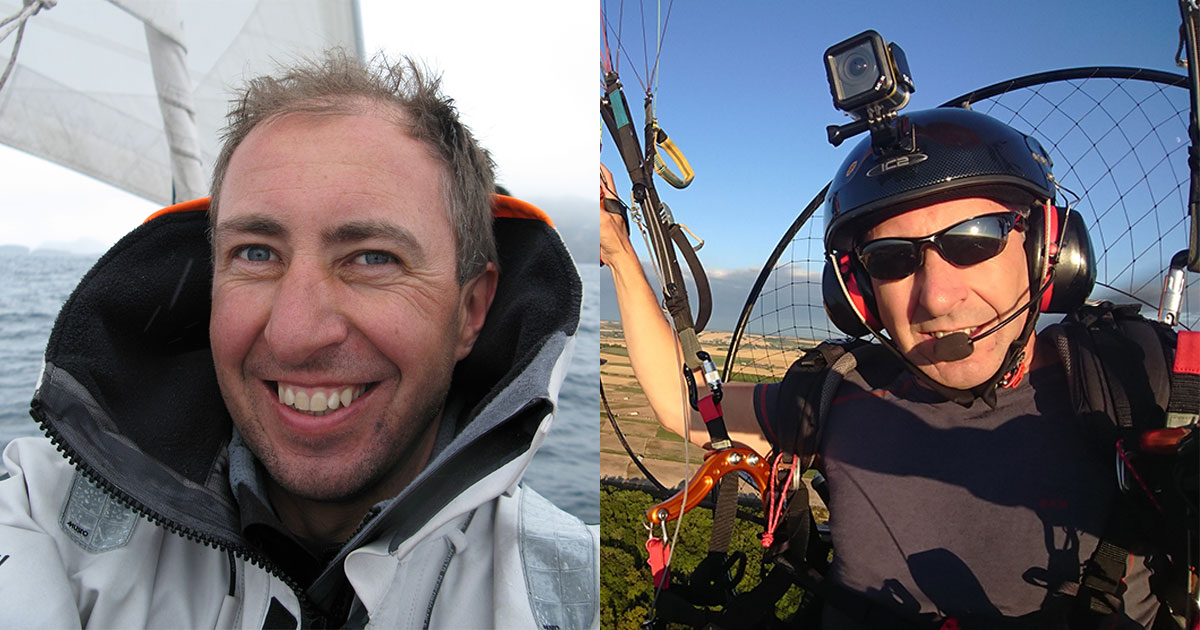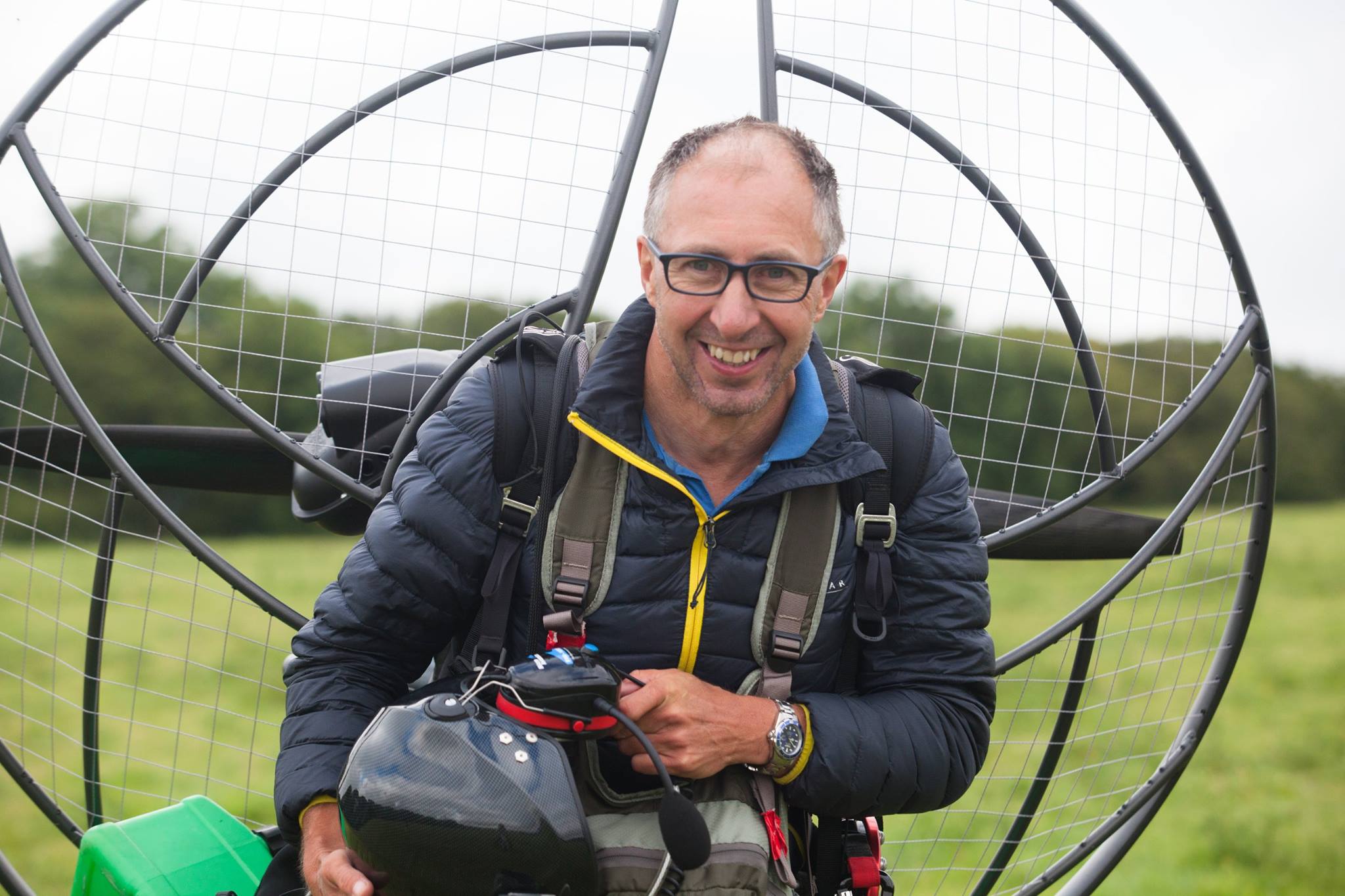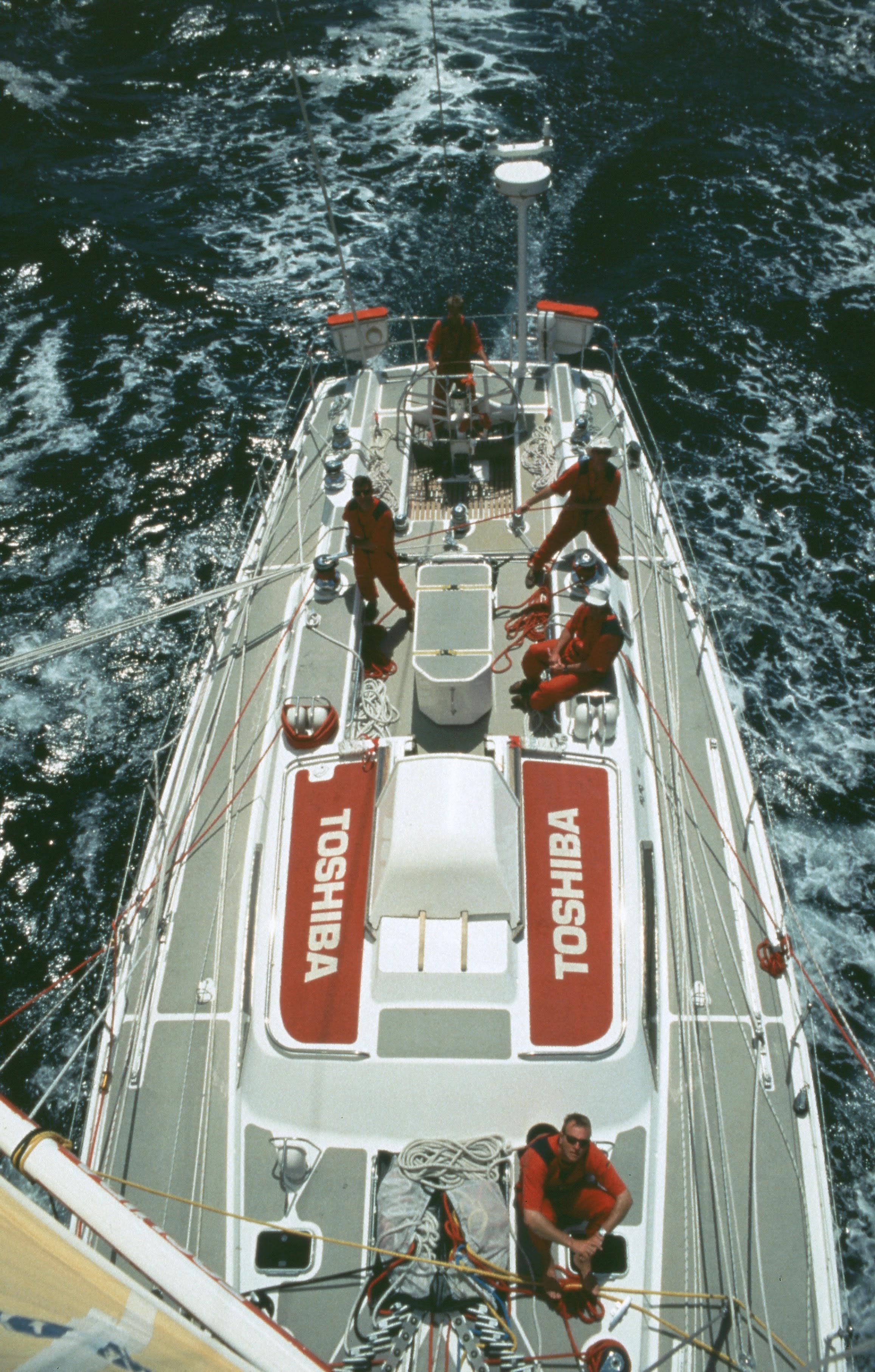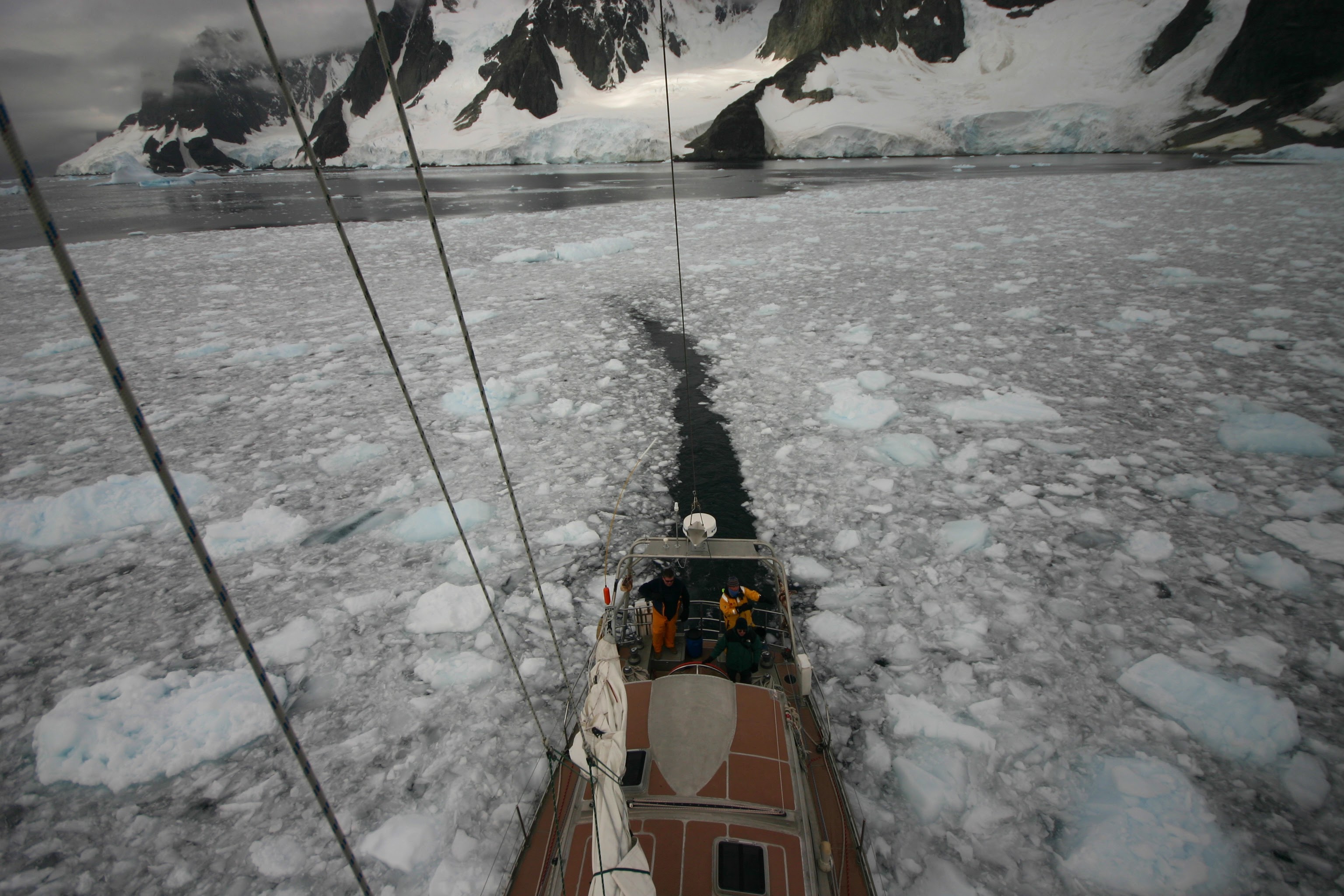If you bumped into Simon Walker in a bar, you’d never guess the calibre of his adventure CV. Unimposing and modest, you have to really probe to find out that Simon is a celebrated sailor of the highest ilk. Having sailed the ‘wrong way’ around the world twice, Simon Walker now sails through the sky in his spare time and his adventures on land, sea and air have taught him things that have set him up for all aspects of his life, including his successful business ventures. We meet him to find out more…
In 1989, Simon Walker was watching British adventurer Sir Chay Blyth on the BBC, talking about a yacht race he was promoting: the BT Global Challenge. A group of twelve 72-foot racing yachts, crewed by ordinary people, would sail around the world ‘the wrong way’, against the prevailing winds, and Blyth was looking for volunteers.
Despite the fact it would mean he was away from home for 10 months, would need to raise £30,000 and wasn’t much of a sailor, the race sparked something in Simon Walker and it wasn’t long before he was signed up and packing his bags.
“In modern life, what is out there that can stretch you?” Walker said about his decision. “And the thing about offshore racing is, it stretches you in so many ways. It’s testing physically and emotionally. You’re leaving your friends and family behind. You get scared. You get exhilarated, it’s very much a roller coaster. I just thought it all sounded fantastic.”
Like most adventures, this first race transformed Simon Walker’s life, and his outlook on it, and when the next race sailed a few years later this time Simon was the skipper of a yacht – the youngest to ever compete in the race, at 28
Simon Walker has a host of sailing achievements to his name. He has sailed across the Atlantic Ocean seven times. He’s led two expeditions to the Arctic Ocean. He won the first Teacher’s Whiskey Round Britain Challenge race in 1995. It was as a skipper in ‘the toughest race of all’ (the BT Global Challenge is a 30,000-mile marathon around the planet – more people have travelled in space than have circumnavigated the globe the wrong way), that Simon leant the most about himself, adventure and leadership.
“During the first race I learnt how to be tough. You endure extremes in temperatures, from below minus 20 up to 35oC, you have to work hard no matter how tired or ill you are and it’s mentally gruelling due to the lack of sleep. You’re at sea for over 160 days, on and off four-hour shifts; when your shift is done, you go below and get four hours to rest before the next shift. Wet, tired, bruised and shivering, it takes a half-hour to get out of your survival gear. It takes another half-hour to put it all back on again, so the off-time really is about three hours. You learn to toughen up quickly!
At the other end of the spectrum, I also learnt the intense elation you get from pulling through such hardships and the feeling of complete satisfaction after a hard day’s physical work. It’s something I’ve rarely found in other walks of life and what, in many ways, has kept me going back to sailing; that and the feeling you get when everything is going right and you’re skimming across the top of the waves, with nothing in sight but miles and miles of ocean,”
“It was during the second race, when I was skipper, that I really learnt lessons that would help outside of sailing. When you are captain of a football or rugby team, by and large, you can determine that if you have the best players and they play well you will win the match. Sailing isn’t like that. If you’re the skipper of a crew in a long race, you have to throw your macho streak in the bin, there are just too many variables, like currents, weather, wind direction, for you to assume that the best crew will win. I quickly learnt that to ‘finish first, first you must finish’; something which has stuck with me to this day and held me in good stead in business. There are a million and ten things outside of your control in both a boat race and in business, whether that be an unexpected iceberg or Brexit. All you can do is be as prepared as you can be and work hard and you’ll come out of the other side one way or another. You may not win, but you’ll be satisfied you did your best.”
This attitude of being prepared and working hard, showed in the way Simon Walker skippered his crew, who finished second in one of the closest finishes in the race’s history. The crew members would do more than steer quickly or trim the sails like speed demons. Sailing fast meant adding value to every task. They’d clean the toilet like pros, to lessen the chance that they’d all come down with a stomach virus. They’d use an Excel spreadsheet to plan out four meals a day, because the way they ate through 800 kilos of food would affect the trim of the boat. The commitment to be fast even affected the way they slept. To help balance the boat, they’d switch bunks whenever the conditions dictated.
Simon Walker also discovered, which again has helped him ever since, that grit and determination is far more important than skill.
“The race is not for everybody, but that’s life. We weren’t looking for ace sailors, or rich kids. Many in our crew had no sailing experience at all before they did their basic training. What we were after was great, extraordinary, ordinary men and women, who really understood what they were letting themselves in for. We looked for a certain spirit and lightness and vitality that would get them through.
These people weren’t superstars. They weren’t rock stars. That’s what made the race special. But they were achievers. They had a tremendous amount of personal pride and self-belief and confidence. They are the lucky ones. They ingest life. They don’t fear it.”
To example his point, Simon explains…
“There was a watch change at two in the morning, so seven people who have been on deck for four hours in immense waves and wind-chill get to go down below. They’re covered in sleet. They’re bruised. They’re exhausted. And they’ve got four hours before they’re due back on deck. They clamber out of their dry suits. They lay out their mouldy sleeping bags on the bunks on the high side of the boat, and they get in. They’ve already used up 30 minutes. After another half hour, the wind shifts, and the guys on deck need to tack the boat. That means the guys down below have to wake up, grab their sleeping bags, walk across the boat, and lay out on the other side. Now they’ve lost even more sleep.
It takes a certain kind of person to do that day after day after day for more than 160 days.”
Even after picking what he considered the best crew, Simon Walker still had to carefully manage them, learning to be ‘boss’ at an accelerated pace compared to an office environment…
At 8 AM one day, Walker and his crew lined up on the boat’s foredeck and prepared to take in the 100-pound anchor. “There was one particular guy who probably drank a few too many beers the night before. Suddenly, he says he’s got a bad back — right in front of the entire crew. Everyone knows his back is fine, so all eyes turn to me to see what I’m going to do. Do I confront him? Do I let him get away with it? I had a split second to decide.
I chose to be unreasonably reasonable and play the guy at his own game. The only way to hold on to my authority was to make him look silly. I told him to trade places with this little woman, Kirsten, who was at the wheel. Now, this big hulking fellow has just lost his place to someone barely 5 feet tall. The next day, I didn’t let him take the anchor or the helm. I had him go below and make tea. ‘The lads will need a cup after their hard work,’ I told him, ‘and we don’t want to put a strain on your bad back.’ Wouldn’t you know, his back magically healed — and he went on to become one of the stars of the expedition.”
The lessons Simon learnt from the race obviously impressed, as he went on to be Managing Director of the race organiser Challenge Business and was instrumental in the next two round the world races.
He also co-founded the online leadership coaching system my360plus and the consultancy Talentsmoothie and co-authored the book ‘Generation Y: what they want from work’.
Simon Walker also became a non-executive director of a company called The Adventurists, who run some of the world’s most renowned adventures, from The Mongol Derby (the world’s longest and toughest horse race) to the Rickshaw Run (a journey across India in rickshaws).
“I thought I knew what ‘adventure’ meant when I became involved in The Adventurists, but it seemed I had a lot to learn.
Before I started working with them, I had a traditional view of adventure. Although more subconscious, than spoken aloud, I thought ‘if you enjoy something too much then it can’t be a proper adventure. An adventure needs to involve blood sweat and tears. I learnt, through The Adventurists, that actually that’s not the case at all. I took part in one of the events we put on called the Moroccan Monkey Run. We were dropped in the Sahara and given Monkey Bikes (basically motorbikes for children) and rode to the coast. We laughed pretty much the whole time, but it was certainly no less of an adventure for it, it was a joy to meet the local people, who showed incredible generosity everywhere we went – especially if we broke down. In one village in the Anti-Atlas mountains, all the kids came out to ‘help’ while the local mechanic fixed the bike with the most basic of tools. None of us spoke the others language, but there were lots of laughs and smiles all round.
So now, if I’m looking for an adventure, ‘nice weather’, ‘good food’ and ‘good company’ are generally on the list.”
It was through The Adventurists that Simon also got introduced to the sport of paramotoring, basically taking to the skies with a paragliding wing above your head and a motor tied to your back.
Hooked, Simon soon found himself flying regularly and is now Managing Director of the world’s largest paramotoring company. A British company, Parajet was founded by the inspirational Gilo Cardozo, who in 2007 set the paramotor world record, flying over the height of Everest with Bear Grylls.
In true Simon Walker style, he’s not settled for just ‘casually’ flying and has flown in 10 countries, including a recce trip for the 2019 Icarus Trophy (the world’s longest paramotoring race) which saw him fly from Victoria Falls in Zimbabwe to Johannesburg.
“It gives you a freedom similar to sailing, but in three dimensions instead of two. There really isn’t anything like it and you get to see the world in a way few people ever do. It truly is adventure at its best, which is perhaps why Bear, Levison Wood and Ben Fogle have all learnt to fly with us.
It’s our mission, as a company, to enable more and more people to feel the joy of flying the most accessible, transportable and affordable form of powered flight. I feel it’s my mission, as a human being, to get more people to take that initial step, as I did when I first saw Sir Chay Blyth on the TV talking about the round the world race, and sign up for an adventure of a lifetime; whatever that may be”
If you’re interested in learning to paramotor head over to https://parajet.com/ for more details.







